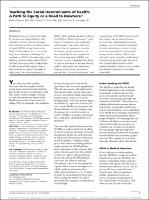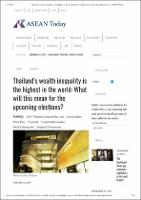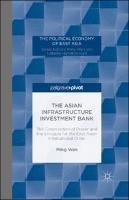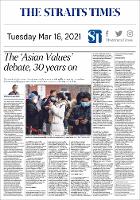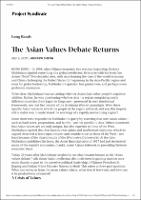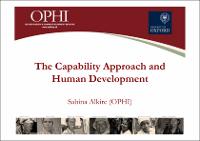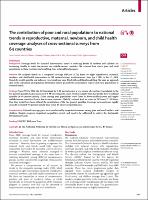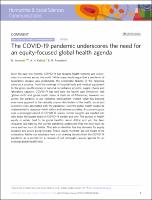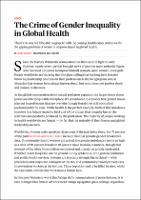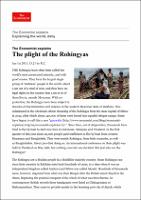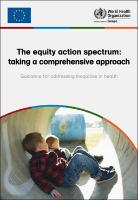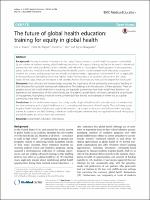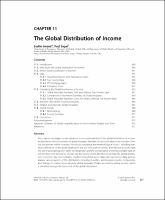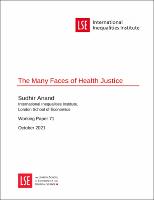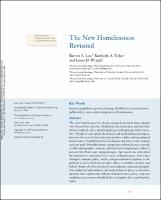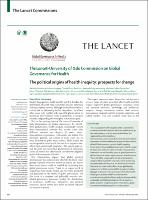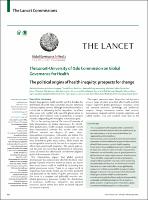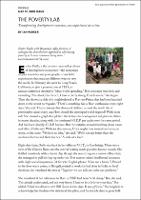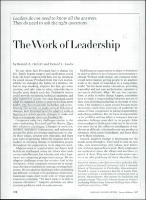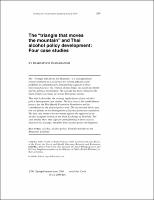Browsing by Title
Now showing items 254-273 of 299
-
Teaching the Social Determinants of Health: A Path to Equity or a Road to Nowhere?
Medical schools are increasingly called to include social responsibility in their mandates. As such, they are focusing their attention on the social determinants of health (SDOH) as key drivers in the health of the patients and communities they serve. However, underlying this emphasis on SDOH is the assumption that teaching medical students about SDOH will lead future physicians to take action to help achieve health equity. There is little evidence to support this belief. In many ways, the current approach to SDOH within medical ... -
Thailand’s wealth inequality is the highest in the world: What will this mean for the upcoming elections?
(United Nation ESCAP, 2019-01-16) -
The Asian Value Debates - 30 years on
(The Straits Times, 2021) -
The Asian Values Debate Returns
(Project Syndicate, 2018) -
The Capability Approach and Human Development
(OPHI : Oxford Poverty & Human Development Initiative) -
The contribution of poor and rural populations to national trends in reproductive, maternal, newborn, and child health coverage: analyses of cross-sectional surveys from 64 countries
(The Lancet Global Health, 2017)
Background Coverage levels for essential interventions aimed at reducing deaths of mothers and children are increasing steadily in most low-income and middle-income countries. We assessed how much poor and rural populations in these countries are benefiting from national-level progress. -
The COVID-19 pandemic underscores the need for an equity-focused global health agenda
(2021-12)
Over the past few months, COVID-19 has ravaged health systems and economies in countries across the world. While many would argue that a pandemic of respiratory disease was predictable, the systematic failures of the response came as a surprise. From the shortage of hospital beds and medical equipment to the gross insufficiencies in national surveillance systems, supply chains and laboratory capacity, COVID-19 has laid bare the health care limitations that ‘global north’ and ‘global south’ share. A stark set of differences, however, run across ... -
The Crime of Gender Inequality in Global Health
(Voice-Foreign Policy) -
The Economist explains_ The plight of the Rohingyas
(The Economist, 2015) -
The equity action spectrum: taking a comprehensive approach : guidance for addressing inequities in health
(World Health Organization, Regional Office for Europe, 2014)
While population health indicators have improved across Europe overall, that improvement has not been experienced equally everywhere, or by all. This is one of a series of policy briefs that describe practical actions to address health inequities, especially in relation to tobacco, alcohol, obesity and injury, the priority public health challenges facing Europe. It offers policy-makers and public health professionals the tools and guidance to implement the Health 2020 vision – the new health policy framework for Europe developed by WHO/Europe ... -
The future of global health education: training for equity in global health
(BMC Medical Education, 2016)
Background: Among academic institutions in the United States, interest in global health has grown substantially: by the number of students seeking global health opportunities at all stages of training, and by the increase in institutional partnerships and newly established centers, institutes, and initiatives to house global health programs at undergraduate, public health and medical schools. Witnessing this remarkable growth should compel health educators to question whether the training and guidance that we provide to students today is appropriate, ... -
The Global Distribution of Income
(Elsevier, 2015)
This chapter investigates recent advances in our understanding of the global distribution of income, and produces the first estimates of global inequality that take into account data on the incomes of the top one percent within countries. We discuss conceptual and methodological issues – including alternative definitions of the global distribution, the use of household surveys and national accounts data, the use of purchasing power parity exchange rates, and the incorporation of recently available data on top incomes from income tax records. We ... -
The Many Faces of Health Justice
(The London School of Economics and Political Science, October 20)
This paper develops the idea of health justice as a plural conception. It draws on the literature on justice from philosophy and economics, and investigates its application and reach in the space of health. Several distinctions are invoked in identifying and contrasting different facets of health justice and injustice. These include active versus passive injustice; process fairness versus substantive justice; comparative versus noncomparative justice; compensatory and distributive justice. Within distributive justice, the health implications of ... -
The New Homelessness Revisited
(Annual Review of Sociology, 2010)
The new homelessness has drawn sustained attention from scholars over the past three decades. Definitional inconsistencies and data limitations rendered early work during this period largely speculative in nature. Thanks to conceptual, theoretical, and methodological progress, however, the research literature now provides a fuller understanding of homelessness. Contributions by sociologists and other social scientists since the mid-1990s differentiate among types of homelessness, provide credible demographic estimates, and show how being homeless ... -
The political origins of health inequity: prospects for change
(The Lancet, 2014-02-11)
Despite large gains in health over the past few decades, the distribution of health risks worldwide remains extremely and unacceptably uneven. Although the health sector has a crucial role in addressing health inequalities, its eff orts often come into confl ict with powerful global actors in pursuit of other interests such as protection of national security, safeguarding of sovereignty, or economic goals. This is the starting point of The Lancet–University of Oslo Commission on Global Governance for Health. With globalisation, health inequity ... -
The political origins of health inequity: prospects for change
(The Lancet - University of Oslo Commission on Global Governance for Health, 2014)
Despite large gains in health over the past few decades, the distribution of health risks worldwide remains extremely and unacceptably uneven. Although the health sector has a crucial role in addressing health inequalities, its efforts often come into conflict with powerful global actors in pursuit of other interests such as protection of national security, safeguarding of sovereignty, or economic goals. This is the starting point of The Lancet–University of Oslo Commission on Global Governance for Health. With globalisation, health inequity ... -
The work of leadership
(Harvard Business School Publishing, 1997)
To stay alive, Jack Pritchard had to change his life. Triple bypass surgery and medication could help, the heart surgeon told him, but no technical fix could release Pritchard from his own responsibility for changing the habits of a lifetime. He had to stop smoking, improve his diet, get some exercise, and take time to relax, remembering to breathe more deeply each day. Pritchard’s doctor could provide sustaining technical expertise and take supportive action, but only Pritchard could adapt his ingrained habits to improve his long-term health. ... -
The “Triangle That Moves the Mountain” and Thai Alcohol Policy Development: Four Case Studies
(Contemporary Drug Problems, 2009)
The “Triangle that Moves the Mountain” is a conceptualized strategy initiated as a social tool for solving difficult social problems, by simultaneously strengthening capacity in three interrelated sectors: (1) creation of knowledge; (2) social movement; and (3) political involvement. The concept has been claimed as the basis of many successes in various Thai policy arenas. This article describes the strategy implications of four alcohol policy development case studies. The first case is the establishment process for the Thai Health Promotion ...

